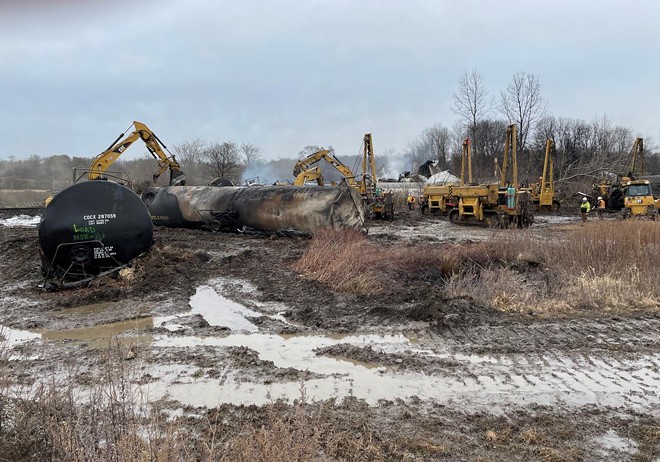It’s been just over three months since a Norfolk Southern train derailed near East Palestine, Ohio. Federal legislation meant to improve rail safety and reduce similar incidents is advancing in the U.S. Senate.
The Railway Safety Act of 2023 is a bipartisan effort led by Ohio’s U.S. Senators, Republican J.D. Vance and Democrat Sherrod Brown. The measure passed the Senate Commerce, Science and Transportation Committee with the support of two Republican members — Vance and Sen. Eric Schmitt of Missouri.
What’s in the bill?
The bill has seen a number of changes in committee, but most key provisions remain. The bill sets a minimum crew size of two, requires wayside detectors at regular intervals and imposes stiffer penalties for safety violations.
Lawmakers also revisited the definition of “high-hazard” trains and the heightened safety requirements that follow. The train in East Palestine didn’t qualify as a high-hazard train under existing law, and so Norfolk Southern didn’t face more stringent notice and information sharing requirements.
In the immediate aftermath of the East Palestine derailment, Gov. Mike DeWine called that “absurd.” Under the changes, the train would carry the classification.
Urban Institute researcher Anne Junod shared her work with Brown and Vance’s offices as they put together the bill. She zeroed in on the hazardous material notice requirements as one of the most impactful changes in the law.
“That notice really has to be advanced notice,” she insisted. “It’s really not enough for folks to kind of be flat footed in the event of a disaster. They need to know ahead of time, especially when you have high hazard trains moving through communities.”
She also pointed to provisions requiring two person crews as “vitally important.”
Potential gaps
The measure includes grant funding for emergency agencies to purchase protective equipment and funding to reimburse agencies after a disaster. But Junod worries rural communities still bear the brunt of accidents.
“It’s a numbers game,” she said, “and there’s more rural small town communities that are located on these rail lines than large metros.”
Junod also warned the existing insurance market, topping out at $1 or $1.5 billion, might not be ready for an urban derailment.
“If you were to see an accident like what happened in East Palestine happen in Columbus, in downtown,” she described, “you could easily — and not at all to catastrophize — but you could easily, handily, very quickly shoot right past that that liability coverage.”
As a model for how to respond, she points to a pooled liability claims fund in the nuclear industry. Nuclear operators pay a premium and in the event of an accident, the fund provides liability coverage beyond what’s available in the private market.
Heading for the Senate floor
Democrats and the three independents Senators who caucus with them hold a narrow majority in the U.S. Senate. But because of Senate filibuster rules, Brown and Vance need to cobble together 60 votes to pass the measure.
Sen. Ted Cruz, R-Texas, voted against the measure in committee and argued the bill “as written” wouldn’t get to 60. In a press call after the vote, Sen. Brown offered a blunt response.
“He’s wrong,” Brown said.
“He was wrong about the bill and Committee,” Brown continued, “he thought there might be no Republicans with maybe the exception of Vance. He tried to weaken it, he tried to slow walk it. We knew we had the support of the country, not just people in eastern Ohio.”
Notably, the proposal has garnered a broad and growing assortment of supporters. Initial sponsors included Republican Sens. Josh Hawley, R-MO, and Marco Rubio, R-FL, as well as John Fetterman, D-PA, and Bob Casey, D-PA.
More recently Sens. Mike Braun, R-IN, Roger Marshall, R-KS, and Mitt Romney, R-UT, signaled their support. President Biden has committed to sign the bill, and former president Donald Trump has voiced his support as well.
Vance alluded to Trump’s support in a press release after the vote.
He thanked colleagues on both sides of the aisle and added, “I’d also like to thank President Trump for his continued support for the people of East Palestine, and for his endorsement of this legislation, which ensured the bill’s passage today.”
Brown noted Senate Majority Leader Chuck Schumer wants to move quickly, but added there’s always queue of bills lined up for the Senate floor.
House prospects
Assuming Brown’s vote count is correct, the Railway Safety Act still faces an uphill climb. Rep. Chris Deluzio, D-PA, has filed a companion bill in the House, but the Ohio delegation has lined up behind a slightly different proposal.
The RAIL Act has the backing of all but four Ohio U.S. Representatives. When it comes to broad strokes, the House measure and the Senate measure are very similar. But the House proposal leaves out significant changes. Perhaps most important, the RAIL Act doesn’t require a minimum of two members on each train.
But before the House and Senate can hash out those differences, the House will need to actually hold a hearing. Several House Republicans argue they shouldn’t be hasty in their response to the East Palestine derailment.
Most notable among their number are the chair of the House Transportation committee as well as the chair of the subcommittee handling railway issues. Both lawmakers have suggested any legislation should wait until the National Transportation Safety Board completes its investigation. The NTSB has released a preliminary report, but it could take them a year or more to complete their work.
Originally published by the Ohio Capital Journal. Republished here with permission.

